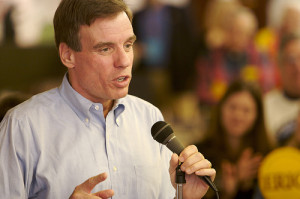Warner, Gillespie, battle Washington ties in VA Senate race

INCUMBENT: U.S. Sen. Mark Warner has to combat his ties to the unpopular president. (Photo by John Rohrbach)
By Kathryn Watson | Watchdog.org, Virginia Bureau
WHITE SULPHUR SPRINGS, W. Va.— Democratic Sen. Mark Warner and his Republican challenger Ed Gillespie will have to prove they’re not “Washington” men.
Warner, a former Virginia governor elected to the U.S. Senate the same year Barack Obama was elected president, has to fend off attacks that his policy is in lock step with the president. As Gillespie hammered again and again during the first debate on Saturday at the luxurious Greenbrier resort, Warner has voted with Obama “97 percent” of the time.
“Governor Warner wouldn’t recognize Senator Warner today,” Gillespie said more than once in attempts to link the senator with Obama and his policies.
CHALLENGER: Ed Gillespie, running for U.S. Senate, has to prove he’s not just a Washington man.with Obama and his policies.
Gillespie has never held public office, but the Republican strategist has been entrenched in the politics of Washington, D.C., for years, as a lobbyist and as a counselor to the George W. Bush administration. Gillespie chaired the Republican National Committee.
“It’s not that you’re a lobbyist, it’s who you lobbied for,” Warner said, referring to Gillespie’s stint as a lobbyist for Enron.
Warner and Gillespie slammed their opponent as a prototype of their party in Washington, D.C.
“I think pretty clearly that’s the strategy for both,” Harry Wilson, professor and director of the Institute for Policy and Opinion Research at Roanoke College, told Watchdog.org even before Saturday’s debate.

THE THIRD OPTION: Libertarian Robert Sarvis is eager to challenge status quo politics in Washington.
Robert Sarvis, the Libertarian candidate for Senate on the ballot, was not invited to Saturday’s debate, meaning the topics of government surveillance — and to some extent, crony capitalism — went untouched. Sarvis told Watchdog.org he needs to be included in the conversation because the other two candidates are, in a way, a part of the problem.
“It’s really unfortunate for voters,” Sarvis said ast week. “This is all about giving voters an opportunity to hear about all the issues that matter. I don’t think there’s going to be much talk about surveillance in the debates, because Gillespie was a part of the administration that started it, and Mark Warner has voted for many of the things that made it possible, and against some of the things that would have reined it in.”
Still, at a time when Roanoke College has Virginians’ approval of the president at an all-time low, 56 percent of Virginians still approve of Warner.
That’s partly because Warner isn’t at the forefront of controversial movements like gay marriage or gun control, unlike the way now-Gov. Terry McAuliffe campaigned, Wilson said. McAuliffe touted his “F” rating from the NRA with pride.
“He’s not going to go out of his way to court NRA, but you’re not going to hear Mark Warner tomorrow say, ‘I’m proud that the NRA is not going to support me this time.’ He won’t say anything,” Wilson said.
That makes Gillespie’s challenge a little more difficult. Gillespie has his own problems — perhaps most immediately, his lack of name recognition. In the most recent Roanoke College poll, 75 percent of respondents said they didn’t know enough about him to form an opinion.
And people have to find him credible, Wilson said.
“At this point right now the chance for Gillespie is to sort of make himself look viable,” Wilson said. “Somebody could say that’s a pretty low bar. But that’s likely the first hurdle in the race.”
Kathryn Watson is an investigative reporter for Watchdog.org, and can be reached at kwatson@watchdog.org.







